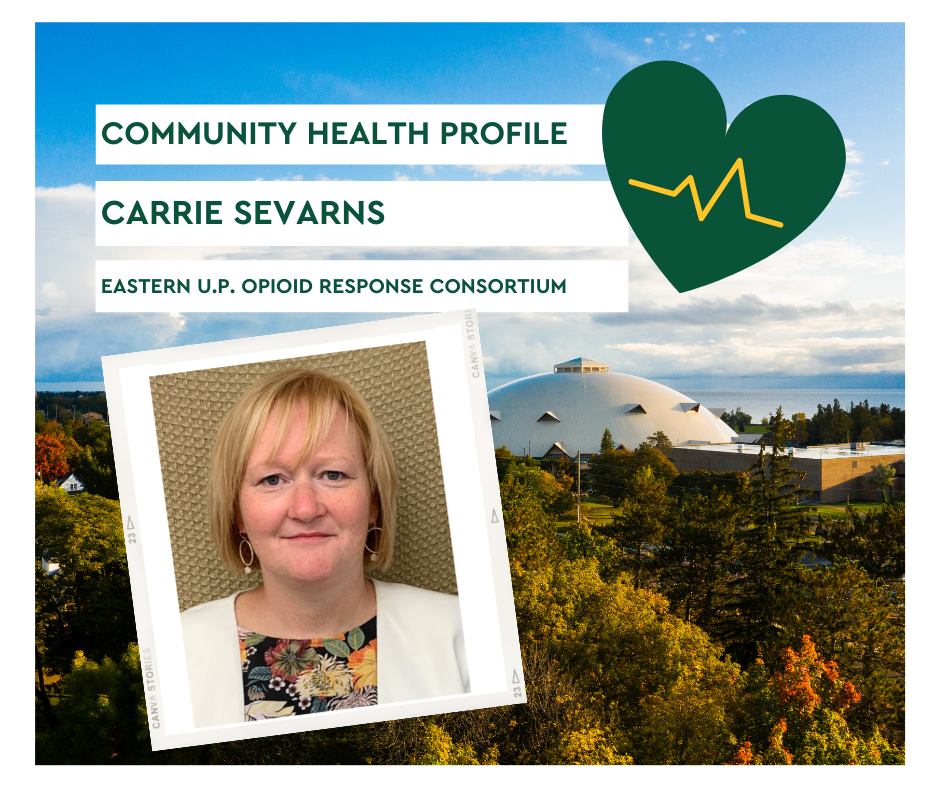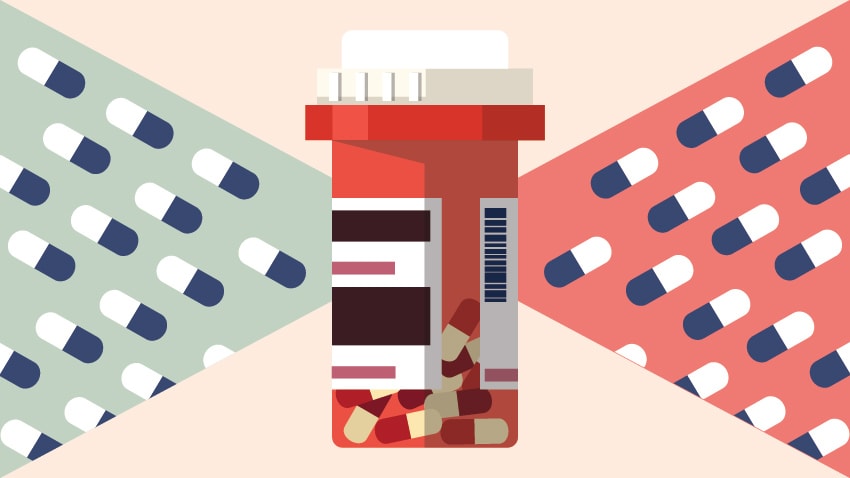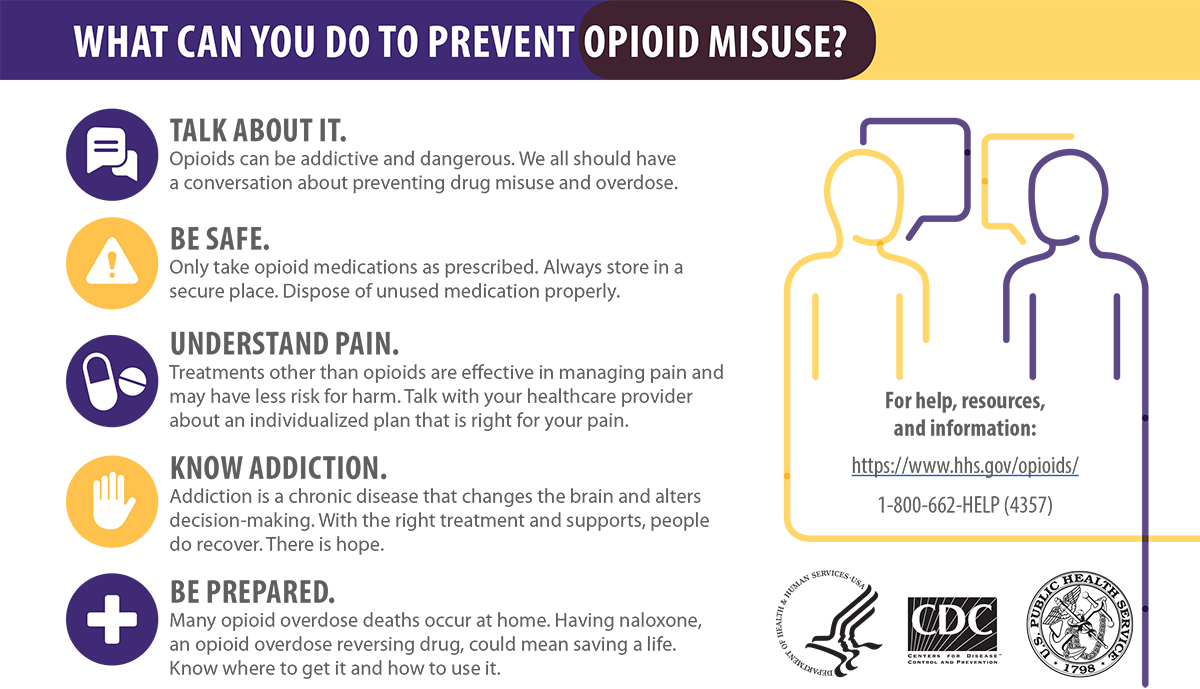Since 2001, the last day of August has been declared Opioid Misuse Prevention Day, also known as International Overdose Awareness Day. According to the CDC, of the more than 93,000 reported drug overdoses that occurred in 2020, three-quarters were attributed to opioids. In the state of Michigan, about 78% of substance misuse related deaths involved at least one opioid in 2018. The Upper Peninsula is not immune to this national crisis, and the Eastern Upper Peninsula Opioid Response Consortium (EUP-ORC) was born out of a need for resources on a community-wide level, from prevention to treatment and recovery services.
EUP-ORC is a 22-member consortium dedicated to improving services in order to reduce harm and heal Eastern U.P. communities impacted by substance and opioid use disorders. EUP-ORC membership consists of every healthcare facility in the five county region, including hospitals, hospital affiliated clinics, federally qualified health centers, community mental health agencies, l ocal public health agencies, and tribal health agencies.
ocal public health agencies, and tribal health agencies.
The consortium offers monthly education on treatment, prevention and recovery. It also connects individuals with resources through referrals with jail and hospital systems. EUP-ORC connects people to services through peer recovery coaches and harm reduction, and is currently expanding Botvin's LifeSkills in elementary schools.
Carrie Sevarns, Project Director for EUP-ORC, has 18 years of experience working in rural healthcare. Sevarns has a passion for improving the well-being of the communities she serves. Her former position as Director of Population Health and Community Clinics at Helen Newberry Joy Hospital helped her build strong relationships that would impact patient care and community health. During her years in healthcare, she led the development of the first wellness center, patient centered medical home, chronic care management, clinic electronic health record implementation, behavioral health and accountable care organization programs and initiatives at Helen Newberry Joy Hospital. She remains active with the Michigan Center of Rural Health Clinic Quality Network Executive Committee Board.
“At a fairly young age I discovered that making a difference or leaving people better off than I found them really mattered to me,” Sevarns said. “I had some great mentors along the way and learned early on the power of connecting with people and the direct relationship those relationships had on patient’s and client’s outcomes. My greatest joy and passion has always been serving my hometown community.”
Currently, Sevarns is supporting substance use education, treatment and recovery efforts through her work with EUP-ORC. This work includes partnering with local organizations to offer resources to community members. EUP-ORC distributes resources to persons being released from jail, which ensures individuals will have resources readily available upon release. EUP-ORC is also partnering with local foundations to increase substance and opioid use disorder awareness education by offering Drug Take Back sites. These initiatives are all pursued in an effort to increase awareness and improve access to care throughout the community.
“Treatment and recovery are possible. It occurs every day,” Sevarns said. “We need to celebrate this and look at every person with substance or opioid use disorder as having the potential to reach recovery.”
Read on for more of Sevarn’s first-hand account of working with the EUP-ORC, and how she hopes to push forward the mission to end opioid misuse in the Eastern U.P. For more information on EUP-ORC and ways you may be able to assist, visit eup-orc.com.
Q&A
--
You have worked in rural healthcare for over 18 years. What drew you to this work, and what makes you so passionate about it?
I have always enjoyed working with the public. With some great mentors along the way, I learned early on the power of connecting with people and the direct relationship that had to my patient’s and client’s outcomes. My passion has been serving my hometown community.
Working side-by-side with some of the most dedicated, skilled healthcare professionals that I am aware of is something I do not take for granted. Healthcare and public health have provided me with a platform to make a difference. I’ve had the opportunity to get to know these professionals and their families, and because of those relationships, you get to really advocate for their patients. I am able to give back to the community that raised me. I think what we do in healthcare makes a difference. That’s what inspired me to continue in healthcare and why I’m so passionate about our communities’ health - I think rural healthcare is the heart of our communities.
How does your previous job as Director of Population Health and Community Clinics help you in your current role with EUP-ORC?
Being the Director of the Population Health and Community Clinics, along with my previous roles that I held within that organization, provided me with the opportunity to learn what goes into well-rounded healthcare. During my career I was provided opportunities to see the whole picture of healthcare from start to finish. Everything from direct patient care, to initiating and developing new programs, to being part of the senior leadership team, to the financials. I never shied away from an opportunity to grow, even if it wasn't in my wheelhouse or comfort zone. I felt that knowing the entire picture would only help me grow. Not only would it help me grow, it also assured the best health care possible to our small rural community. I’ve taken those experiences and have applied them in my work at EUP-ORC. Everything from the patient level seen through the eyes of the patient to developing programs and partnerships. I am grateful for the opportunities I was given in my previous role and it only helps me in my new role as a project director.
 Currently, you are working on supporting substance use education, treatment and recovery efforts in the eastern portion of the U.P. Can you tell us about your experience working on this particular initiative (grant)? What have you learned?
Currently, you are working on supporting substance use education, treatment and recovery efforts in the eastern portion of the U.P. Can you tell us about your experience working on this particular initiative (grant)? What have you learned?
I have had the pleasure of working with multiple leaders and agencies across the Upper Peninsula and the state of Michigan. I have worked with people I’ve known for a long time and have also been introduced to great leaders that I had never met. What astounds me every day is the commitments and efforts being organized across multiple organizations and communities related to substance and opioid use. We have a lot of great work happening throughout Michigan. I’ve learned that there is no greater advocacy group than those in recovery and their families. I’m motivated daily by hearing their stories and seeing their successes. To make a difference we need to take a community level approach; it needs to be all hands on deck.
This is not something just one organization can make a difference in, it needs a collective community effort.
If you could name the most important, crucial piece of curbing opioid and substance use disorder in the E.U.P., what would it be?
If there was one thing that I could accomplish it would be to improve community understanding of substance and opioid use disorder and reduce barriers to treatment. Education and understanding is critical to recovery.
I feel things are changing for the positive in the Eastern U.P. The conversations I am having now with our partners and community wouldn’t have been possible in the first few months of starting as Director of the EUP-ORC because the understanding of substance and opioid use was not there yet. Just the other day I had a conversation regarding Substance Use Disorder. What I loved about the conversation was that even though we all have different roles when it comes to substance issues, we both agreed that the only solution is acknowledging and creating safe places to have discussions. Once those things start happening, people will feel more comfortable coming forward to ask for help. That is the only way we’re going to find solutions. People need to feel they can walk into any organization across the community without judgement or risk and know they will be directed towards assistance.
What are some steps currently being taken to improve resources available to our community?
Currently, EUP-ORC is distributing resources to individuals being released from jail, so that upon release they are connected to resources. We have partnered with various local community groups (local sheriff offices, Communities that Care, MSU Extension Offices, local jails to name a few) to offer drug take-back and community education. We also offer support to local healthcare organizations to set up behavioral health and SUD treatment facilities by partnering with the Michigan Opioid Collaborative. Every step we take our goal is focused on prevention, reducing barriers, and improving access to treatment and recovery.
We’re just starting, there’s so much more to do. We’re not even close to where I want to be, but we’re making strides in that direction.
In your experience, what are some common misconceptions or lack of information relating to opioid and substance use disorder?
With substance use and opioid use disorder, people often assume an individual can never recover. That's not the case.
Substance use and opioid use occurs across the spectrum of race, economic status, and upbringing. It may have started with a choice, however, there is scientific research that tells us what happens with the brain during substance or opioid use. It’s important to understand that it becomes difficult for individuals to ask for help or seek treatment when they feel as though their life doesn’t matter or that they will be judged when presenting for help. I’ve had the honor of speaking with many people in recovery and across the board that is one of the barriers that stopped them for asking for help. People need to feel safe when approaching professionals or community members for help. Each community can change this by being open to engaging in thoughtful conversation related to SUD and OUD, ensuring they are knowledgeable in the most recent evidence based information, and allowing the sharing of recovery stories. To me seeing and hearing success stories is the best way to change people’s hearts and minds.
Treatment and recovery are possible. It occurs every day. We need to celebrate this and look at every person with substance or opioid use disorder that we come across as having the potential to reach recovery if we can help them and try.
Can you tell us how members of the community can aid in the EUP-ORC’s mission?
No agency or individual will be turned away. We want all hands on deck. Everyone in the community has a voice in this and can impact the lives and families impacted by SUD and OUD. To get involved in our work visit our website or reach out and call us (906) 322-8022. We’ll work with you to determine how you or your organization can best partner with the work of the EUP ORC.
What is your connection with the NMU Center for Rural Health? How does this partnership benefit your work or how may it benefit in the future?
Elise Bur (Director, NMU Center for Rural Health) was one of the first people that reached out after I took on the role of Director at the EUP ORC to introduce herself and welcome me. I think Elise had just started in her role as well. I knew immediately from our conversation Elise would be a great partner and work hard to advocate for the Upper Peninsula.
Currently Elise and I are discussing working together to develop education and training for community health workers. We are collaborating on efforts that fit a need across the U.P. and discussing how we can partner.
In my opinion, the NMUCRH is going to become a center to leverage knowledge, programs, professional development opportunities, and funding for the region. The U.P. is unique, we have different barriers and resources, the NMU Center for Rural Health will be that hub that pulls it all together and creates some real advocacy for the great work happening in the Upper Peninsula and that is powerful. I am excited to see where the NMUCRH is five years from now and hope to still be a part of the great advocacy work being done through the NMUCRH.

--
The Northern Michigan University Center for Rural Health seeks to improve the health and well-being of Upper Peninsula residents and communities by developing collaborative partnerships that enhance the access and availability of affordable, quality healthcare services. For questions or comments related to this story, contact ruralhealth@nmu.edu.
